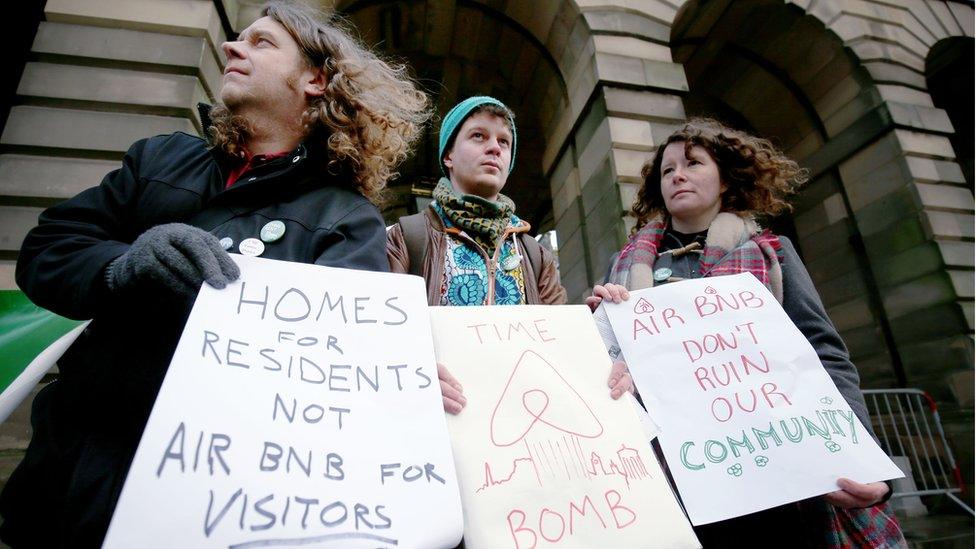New powers to crack down on Airbnb-style lets in Scotland
- Published
Opposing views on the effects of Airbnb on Edinburgh
Councils are to be given new powers to tackle problems caused by the rapid growth of Airbnb-style holiday lets in many areas of Scotland.
The Scottish government said councils will be able to introduce licensing schemes for short-term lets from 2021.
These will allow local authorities to establish designated areas where planning permission is needed before properties can be rented out.
The scheme will also set safety requirements for all short-term lets.
And councils will be allowed to include further conditions to help tackle littering or overcrowding of properties.
The government also said it will review how short-term lets should be taxed in the future to ensure they make an "appropriate contribution to local communities and support local services".
The scheme would work alongside the government's plans to give councils the ability to introduce a so-called tourist tax, external in the future.
The move is in response to concerns from residents in some popular tourist destinations - particularly Edinburgh during the Festival - that the growth of short-term lets is pushing up rent levels for other properties, as well as increasing the amount of litter, noise and anti-social behaviour.
Research commissioned by the Scottish government found a three-fold increase in Scottish properties let for short-term use since 2016, with 32,000 recorded in May of last year.
More than 2,700 listings were recorded in Edinburgh, with the city's Old Town area found to have 812 active Airbnb listings per square kilometre - while on Skye, holiday lets accounted for nearly 20% of all homes on the island.
A majority of the more than 1,000 respondents to a Scottish government consultation on the issue backed the introduction of reforms, but they were divided over what should be done.

Local government minister Kevin Stewart told the Scottish Parliament that short-term lets can offer people a flexible travel option and have "contributed positively to Scotland's tourism industry and local economies across the country".
He added: "However, we know that in certain areas, particularly tourist hot spots, high numbers of short-term lets are causing problems and often make it harder for people to find homes to live in.
"That is why we are empowering local authorities to implement a system that works for their area."
What has the reaction been?
The announcement was welcomed by Adam McVey, leader of the City of Edinburgh Council, who said it would give the local authority the control it needs over short-term lets.
He added: "It meets our request for mandatory licences and we will now be in a position to more effectively implement planning controls to stop this increase.
"A review of taxation in this area will also make sure that businesses are paying properly for income they're receiving and local services they're using."
Scottish Greens MSP Andy Wightman, who has been campaigning for the rules around holiday lets to change, said the announcement was long overdue, but would be welcomed by communities that have been adversely affected by short-term lets.
He added: "It's clear that no licenses should be issued unless proper planning consent is in place, and I am disappointed that the Scottish government don't seem to share that view."
The Scottish Conservatives said they agreed that regulation was needed - but said the government had given "next to no details on how this might work".
What about Airbnb?

Airbnb insists it is good for cities despite opposition from some residents
Airbnb said it had yet to see the details of the Scottish government's announcement, but would be seeking clarity on areas including the financial cost of licensing and how taxation of short-term lets would operate alongside existing proposals for tourism taxation.
A spokesman said: "We have long supported calls for fair regulations and a tourism tax in Scotland. Now we want to work with the Scottish government and local authorities on clear and simple guidance for hosts.
"Together we can help Scottish families share their homes and follow the rules, and avoid a system that excludes working families through fees, barriers and bureaucracy. Our platform is an economic lifeline for countless local families and travel on Airbnb boosts the Scottish economy by almost £2m a day."